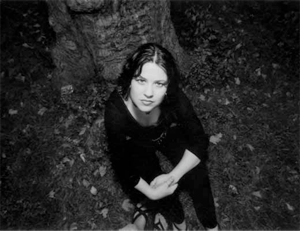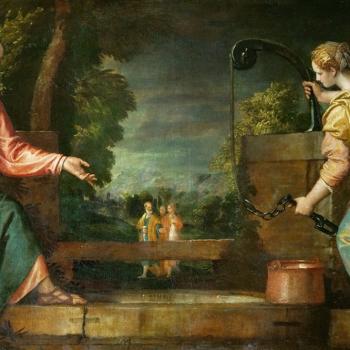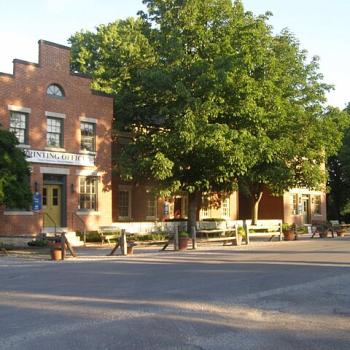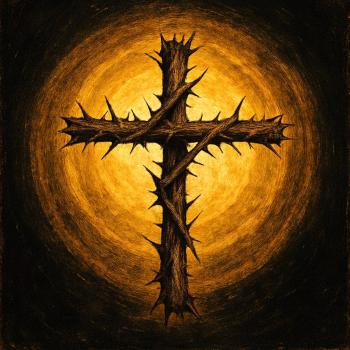By E.B. Solomont -- June 30, 2009
Photo by: Nedara Carlebach
 Neshama Carlebach is music royalty. She is the eldest daughter of the late singer and songwriter, Rabbi Shlomo Carlebach, who is credited with penning the tunes behind many of the synagogue prayers. Neshama began performing her father's music just weeks after his death in 1994. Today, she is known by her first name, the Hebrew word for soul. She sells out shows around the world, in part because many people consider her to be a reincarnation of her father, with her soulful voice and spiritual melodies, not to mention, her lustrous curls.
Neshama Carlebach is music royalty. She is the eldest daughter of the late singer and songwriter, Rabbi Shlomo Carlebach, who is credited with penning the tunes behind many of the synagogue prayers. Neshama began performing her father's music just weeks after his death in 1994. Today, she is known by her first name, the Hebrew word for soul. She sells out shows around the world, in part because many people consider her to be a reincarnation of her father, with her soulful voice and spiritual melodies, not to mention, her lustrous curls.
But recently Neshama has ventured out of her father's shadow, although she is reluctant to describe his legacy as such. "I never feel like I'm in my father's shadow. I feel like I'm in his light," she says. "My father was never that person to tell me how to be or how to act."
After years of performing his songs, Neshama is about to release her sixth album, a collaborative effort with her longtime musical director, pianist David Morgan. "It's sort of a big step for us," she says. "I'm more inspired than I've been in a long time."
We speak by phone, hours before Neshama is scheduled to fly to London for a five-day concert tour. The day before, she canceled a lunch meeting at a kosher cafe near her home in the Riverdale section of the Bronx. She leaves an impassioned message on my voice mail, describing the stress of traveling and of leaving her one-year-old son for the first time.
"I'm freaking out," she tells me when we connect the next day. On her cell phone, she is already at the airport and waiting to clear security. She sounds strung out. "It's just not OK for him to be traveling anymore," she says of her son, whom she brought on the road when he was five weeks old and not nearly as mobile. "I spent the entire day crying. I'm kind of numb right now."
But even in her emotional state, Neshama delivers the passion she is known for both onstage and off. Long defined by her role as a daughter, becoming a mother has changed her, she says. "I feel like I have a whole new perspective on life, I'm more open and more vulnerable. I feel like I have more to give and more to say ... Definitely, I don't think I could be shallow again. Not that I ever was," she says.
When Neshama performs, her voice -- throaty but radiant -- soars over divinely inspired notes. But on this point, Neshama distinguishes herself from her father, who used music to reach disenchanted Jews. "Even though I hope people feel closer to God, I'm not singing to get them to shul (synagogue)," she explains.
I observe that these ebbs and flows -- similarities and differences -- have defined Neshama as Shlomo Carlebach's daughter for most of her adult life. "I love my father's music more than anything in the world," she says. "I want to live my father's legacy because I felt it was left to me."
Raised in Toronto, Neshama dreamed of a career on Broadway, and as a child she studied acting, singing, and dancing. She began performing with her dad when she was only a teenager. "It was intimidating," she tells me. "My father never wanted to rehearse anything, go over anything."
After he died when she was 15, Neshama took over his performance schedule, effectively assuming his musical legacy. "I grew up quick," she says. "The minute my father passed away, it became apparent that this was my music. It was the most precious gift."
It has also been a complicated gift.
To this day, groups of Orthodox Jews and some of her father's most ardent fans criticize Neshama's decision to perform his songs. Famously, the last album that Shlomo recorded before his death -- a duet with Neshama -- was not released for nearly three years because of a protracted legal dispute with the recording technician.
Neshama is fiercely protective of her father's songs. "There are so many Shlomo wannabes," she says, of those who would capitalize on her father's life and music. "Every song is like a diamond that I guard with my life."
Just last month, Neshama says she received an angry email from someone who chastised her for singing publicly because she is a woman. (Orthodox Jewish tradition prohibits women from singing in front of men.) In recounting the episode, Neshama quickly defends her performances, which have been sanctioned by several rabbis. "We're not living in a shtetl anymore," she says.
As if to underscore this last point, Neshama describes another project she is working on: a seventh album, which she is recording with a gospel choir in the Bronx. Ironically, this pairing is reminiscent of her father's first record, produced in 1958, which includes background vocals sung by a Baptist gospel choir.
Neshama mentions that her father was sharply rebuked when he was seen walking into the church; similarly, she has gotten into trouble for singing with the choir. (People have mistaken her for a member of the group Jews for Jesus.)
But like her father, she shrugs off the criticism. "I'm very proud," she says of singing with the choir. "Their voices are exquisite, so soulful. I feel like the world is full of light when these people are singing." Consciously or not, she channels her father with her next words: "The world is too broken and we have too much to fix to be walking around and judging."
This article first appeared in AJL Magazine.
Judaism Jewish
1/1/2000 5:00:00 AM




